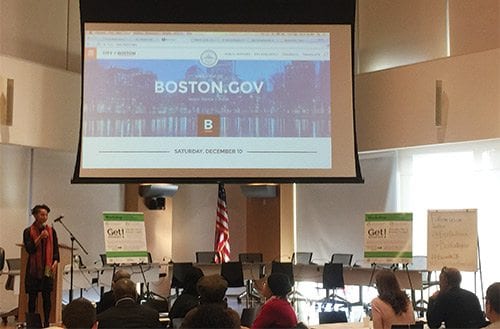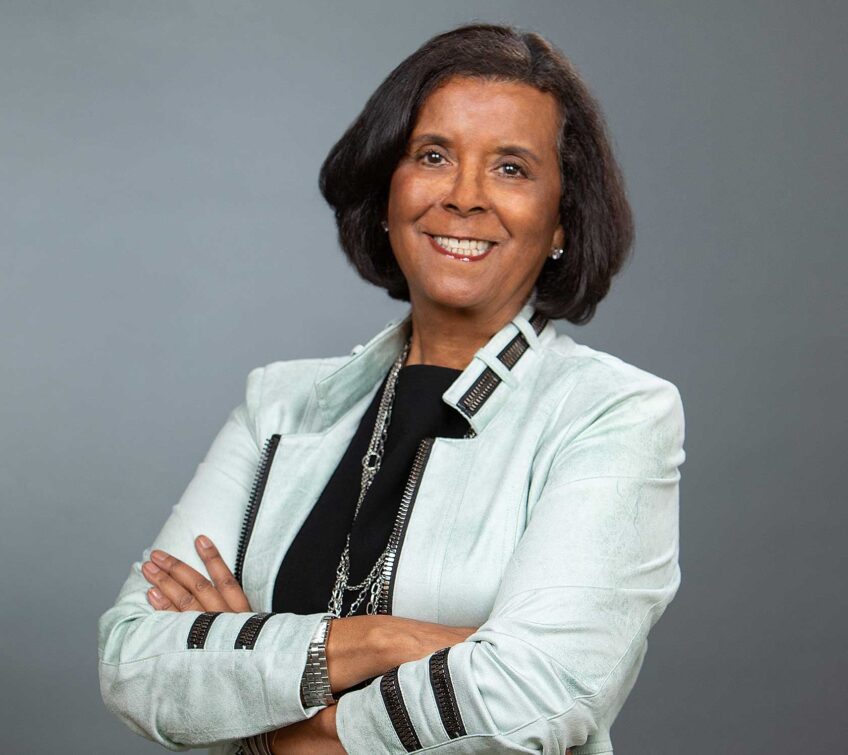
Boston has 40,000 small businesses that provide some 170,000 jobs, nearly half of all employment in the city, according to the city’s Small Business Plan released last May. And the vast majority of the city’s small businesses — both downtown and in Boston’s many neighborhoods — are “micro-businesses” with fewer than 10 employees and less than $500,000 in revenue.

Author: Photo: Courtesy City of BostonThe Bolling Building held a Certification and Contracting with the City workshop recently.
On the web
Mayor’s Office of Economic Development: www.boston.gov/departments/economic-development
City of Boston Small Business Plan: http://bit.ly/2jLJq6v
Guide to starting a business in Boston: www.boston.gov/starting-business
Recognizing the importance of small business opportunities for livelihoods and wealth building, the Mayor’s Office of Economic Development (OED), formed in 2014 by the incoming Walsh administration, has been ramping up its efforts to support existing and new small businesses, providing a range of services to help them get a foothold, survive and thrive.
Karilyn Crockett, the OED’s Director of Economic Policy and Research and Director of its Office of Small Business, told the Banner that much of the city’s work with small businesses is guided by findings in the Small Business Plan report. The report identifed a clear need by small business owners for both direct technical assistance, including connections with mentors and coaches, and greater awareness of the resources available to them.
“There are about 250 different business service organizations around Boston, but business owners could only name two or three,” Crockett said. “We’ve taken that as a mandate.”
Through the OED, small businesses can get answers about licensing and permits and can access services such as on-site technical assistance, design assistance for storefront improvements and energy efficiency evaluations, all at no charge.
The OED runs a variety of workshops. An upcoming session will cover using Instagram to promote a business. In East Boston, a set of local small businesses gathered recently, with the help of the East Boston Chamber of Commerce and the East Boston Merchants Association, for a workshop with the OED’s technical assistance providers.
“What we’ve found in East Boston and other neighborhoods is that leveraging existing business organizations can help us be more effective,” said Crockett. “We were able to bring people together.”
Even as Boston has experienced economic growth in the past decade, communities of color continue to have higher unemployment and lower average incomes.
“Small businesses contribute to social equity and inclusion by serving as an entry point for workers with diverse education and experience levels,” the Small Business Plan report notes. “A vibrant small business ecosystem is a cornerstone of efforts to extend economic opportunity to all residents.”
Roughly one-third of Boston’s existing small businesses are minority-owned. The plan outlines policies and programs aimed at leveling the playing field, ensuring that under-represented groups have access to opportunities, networks and resources crucial to small business success.
Lauren Jones, the OED’s Director of Business Strategy, said her office is working to prepare a pipeline of the city’s local youth for opportunities in the area’s booming high tech sector by connecting with schools and summer jobs programs and partnering with Hack.Diversity, an initiative that connects black and Latino students with internships and mentorships with professionals of color in the tech industry.
And for entrepreneurs navigating the Boston startup scene, Jones mentioned StartHub.com as a “one-stop shop” for workshops, networking, and other activities that can assist and connect start-ups. StartHub is a partnership between the City of Boston and Venture Café, Gust, IBM and other partners.
In some cases, the OED’s small business assistance has led not only to a wider awareness of business obstacles, but to new policies. An example is the “Acoustic on Main” program implemented this month that removes administrative and fee burdens from businesses seeking to host small musical performances.
The launch of the new performance ordinance was celebrated at Dudley Square’s Suya Joint. Crockett said her department had been assisting the African restaurant with sign improvements already, and the easing of performance permitting offered the eatery another boost.
“Suya Joint is a business we’ve had a relationship with for some time. It’s not just a one-shot deal,” Crockett said. “And it’s a two-way street — that partnership not only benefited this business owner, but grew into new city policy.”
Not every small business obstacle has an easy policy solution; the high cost of renting space is a case in point.
“There are definitely parts of the city where the need for affordable space is really getting the squeeze,” Crockett said, citing Roxbury’s Dudley Square and Jamaica Plain’s Egleston Square as examples. “We’re being pulled into other conversations, where businesses have seen their rents double or even more,” she said.
While rising rents can be a sign of healthy growth, Crockett noted, “The vulnerability of small businesses has to be taken into consideration.”
A recent workshop in Egleston Square, delivered in English and Spanish, covered legal and practical aspects of business leases.
“One of the obstacles for existing businesses is that many don’t have leases, or don’t understand their lease terms,” Crockett explained. “It’s not just about affordability [of initial rents], but also being able to stay and grow the business.”






